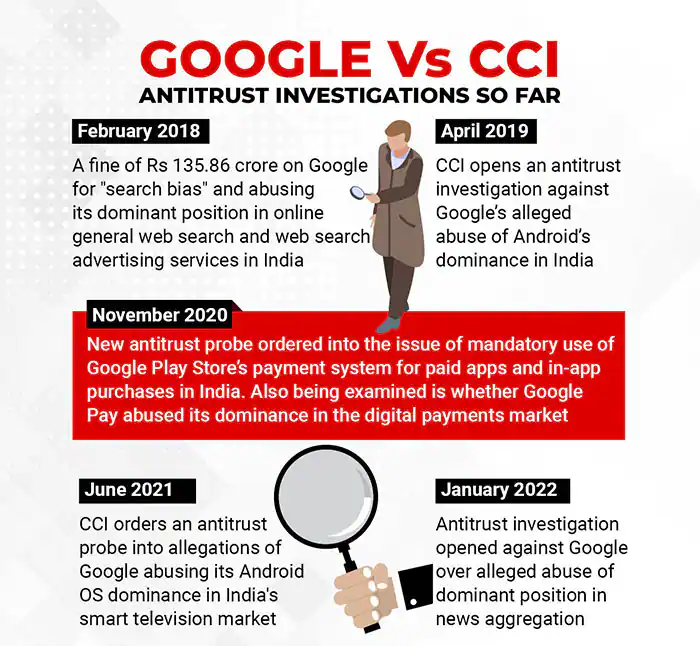TAKING ON THE TITAN
October 29, 2022 | Expert Insights

The recent ruling by India's competition authority against Google for misusing its dominant position in the Android mobile device ecosystem is significant. Not only is the fine amount substantial, but it will change the way the IT giant maintains its market leadership through its thinly veiled monopolistic policies.
Background
Any laptop user using Windows would be familiar with the incessant message that flashes on the screen asking the user to use Chrome as the default internet browser. Similarly, Android smartphone users are consistently pressed to use many Google apps only; in many cases, the users are not aware that many apps of smaller independent players find it hard to find a place in Play Store if it clashes with Google's apps.
While many European countries have long taken action to reduce Google's overwhelming presence in the apps market, belatedly, India is also finally confronting the tech giant with its 1969 vintage Monopolies and Restrictive Trade Practices Act (MRTP Act). Based on the doctrine of a ‘command and control’ economy, this legislation was created to prevent the concentration of economic power in a few hands. Trade practices that were monopolistic and restrictive in nature and killed fair competition were considered against the interests of the general public under this Act. However, a more comprehensive law was felt necessary after India's economic liberalisation of the early 1990s. Therefore, in 2002, the Indian Parliament passed the Competition Act.
Anti-competitive agreements, abuse of a dominating position, and combinations are the three forms of behaviour that the Competition Act principally tries to regulate (i.e., mergers, acquisitions and amalgamations).

Analysis
Google was fined Rs 936 crore ($113 million) by the anti-trust agency for its "anti-competitive measures" on its Play Store. This comes after it fined Google $162 million ($1.338 billion) last week for abusing its control over several regions with its Android mobile operating system.
Government agencies claim that Google violates Section 4 (2) of the Competition Act by using its Play Store dominance to control online search apps. There were multiple violations as per the charge sheets filed in court.
The first was that Google was "abusing" its dominant position by tying up the Google Chrome App and the YouTube App with the Play Store, and this violated the provisions of Section 4(2)(e) of the Act. The second violation was for Google abusing its market position in Play Store to promote its payments app and in-app payment system.
Google was cautioned by the Competition Commission of India (CCI) not to prohibit the use of third-party billing/ payment processing services, and a deadline was imposed for removing the restrictions.
The CCI has been hyperactive in the recent past, acting against "anti-competitive" practices in the tech sector. It has imposed fines amounting to Rs 1,337.76 crore (Rs 936 crore penalty on Google and Rs 392 crore on the travel and hospitality websites MakeMyTrip, GoIbibo, and Oyo).
The regulator has issued a cease-and-desist order against Google, requiring it to significantly alter the terms of its agreements with original equipment manufacturers. Additionally, Google was mandated to implement eight remedies or operational changes within three months, including not limiting app developers from using any third-party billing/payment processing services, whether for in-app transactions or the purchase of apps. Google should make sure that all communications with app developers are entirely transparent, the CCI continued, adding that service price information is disclosed.
To the regulator's credit, Google's anti-competitive activities have been identified, even though the option of legal appeal is still available. The mobile users of a potential digital superpower like India require a true choice-rich environment. The ruling, according to Google, is a "huge setback" for Indian firms and customers since it introduces security risks and might increase the price of mobile devices.
Assessment
- The cease-and-desist order may require Google to modify its Indian business strategy. On the other hand, the order would greatly relieve Indian start-ups and smaller businesses who have long protested Google's policy of requiring app developers to utilise its payment system.
- The rulings led to the CCI establishing a separate Digital Markets and Data Unit (DMDU), which intends to increase its capacity for researching potential anti-competitive behaviour by tech corporations. This would be a game changer for the future monitoring of unfair market practices.








Comments